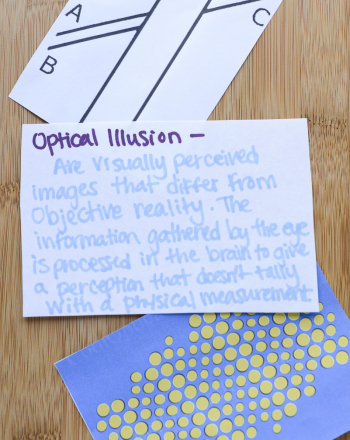
Cargando...
¿Qué puedo hacer?
224315 materialEducativo
textoFiltroFichatipo de documento Ciencias Sociales - Experimento/Práctica
Acerca de este recurso...

The eye and brain are both easily fooled. There are many kinds of optical illusions. Some involve color and/or contrast. Others use perceived shapes. Still more require the image to move to create the illusion.A simple example is to hold your finger in front of your face. You will seem to be able to see through it. But if you close one eye, your finger will become solid. For other illusions, the brain is used to perceiving things a certain way. A railroad track seems to be coming together in the distance. Knowing that the tracks are straight and parallel doesn’t prevent this automatic depth perception in real life, while drawing it on paper gives that illusion of distance and size because we are used to seeing things that way. Also, because of how the retina works, objects can seem to change in color, disappear or even move, or can be seen clearly even after the eyes are closed.To demonstrate various kinds of optical illusions. The student has the option to deal with illusions in general or to specialize in a particular type of illusion.
It is an educational content by education.com.
By clicking on the title of this resource, you will be redirected to the content. If you want to download the project, you just have to join the website, which now is for FREE.
Contenido exclusivo para miembros de

Mira un ejemplo de lo que te pierdes
Autores:
Categorías:
Etiquetas:
Fecha publicación: 12.5.2016
Se respeta la licencia original del recurso.
¿Quieres comentar? Regístrate o inicia sesión
Añadir a Didactalia Arrastra el botón a la barra de marcadores del navegador y comparte tus contenidos preferidos. Más info...
Comentar
0